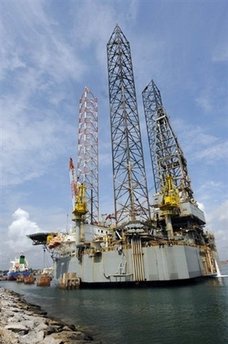
Ghana, riding high from President Barack Obama's visit this month, quietly signed a long-awaited development plan for one of the biggest oil discoveries in West Africa in the past decade.
The agreement -- reached July 15 with a group of international oil companies after months of negotiations -- brings Ghana much closer to its stated goal of producing oil by the second half of 2010.
Celebrated for its democratic rule and stability on a continent more often associated with coups d'état and violence, Ghana is trying to figure out how to handle the oil discovery responsibly and avoid the problems that have beset other oil-rich African nations.
In 2007, a joint venture backed partly by two American oil companies discovered significant oil deposits off the coast of southwestern Ghana. The Jubilee Field, the most promising find, is estimated to hold at least 650 million barrels of recoverable oil, with estimates going as high as two billion barrels of oil.
The field is controlled by a partnership between London-based Tullow Oil PLC; Dallas-based Kosmos Energy, which is backed by U.S. private-equity firms Blackstone and Warburg Pincus; Houston-based Anadarko Petroleum Corp.; as well as the Ghanaian government.
The operators expect Jubilee to produce about 120,000 barrels a day by the second half of next year.
While this isn't close to the amount being produced in the larger oil players in Africa -- namely Nigeria and Angola -- oil production could bring Ghana $1 billion a year in revenue by the end of next year, the International Monetary Fund estimates.
Ghanaian officials are aware of the burden that oil and natural-gas riches have brought to countries like Nigeria, and they are carefully negotiating their position with the oil companies. During an industry conference last year in Accra, Ghana's capital, Nigerian oil and natural-gas professionals were invited to speak about what their country had done wrong.
Nigeria has squandered hundreds of billions of dollars in oil revenue over the past four decades due largely to corrupt government officials. It also faces a violent militant campaign that has led to hundreds of foreigners and locals being kidnapped and pipeline attacks that regularly shut down the flow of oil.
That Ghana has held five consecutive democratic elections -- the most recent one in December -- and is mostly peaceful has inspired confidence among many analysts that the country will better handle its oil and gas resources than Nigeria or Angola and Equatorial Guinea.
Ghana has a more diverse revenue stream than Nigeria and Equatorial Guinea: It is the world's second-largest cocoa producer after neighboring Ivory Coast and Africa's second-largest gold producer after South Africa.
But its per capita income is still among the lowest in the world, 30% of the population lives on less than $1.25 a day, and inflation increased to 20% earlier this year after food and fuel prices jumped.
A $600 million financing program from the IMF was approved July 16, and is meant to help Ghana bolster its economy, which is expected to grow by 4.5% this year, before oil production begins. The IMF predicts Ghana's growth could rise as high as 24% when oil starts to flow.
While the country has weathered the global slump relatively well, it faces a ballooning budget deficit and growing trade imbalances. President John Atta-Mills aims to bring the budget deficit down to 9.4% of gross domestic product this year from 14.9% at the end of 2008.
The development agreement between Ghana and the oil companies paves the way for concrete steps to be taken on the production of the Jubilee Field.
The next expected move will be the sale of Kosmos's stake in the field, expected to sell for anywhere from $3 billion to $6 billion, according to industry officials.
Some international oil companies have expressed interest in the Kosmos stake. Ghana's state oil block, the Ghana National Petroleum Corp., or GNPC, also said it is considering buying the Kosmos stake. GNPC recently hired Morgan Stanley as financial advisers.